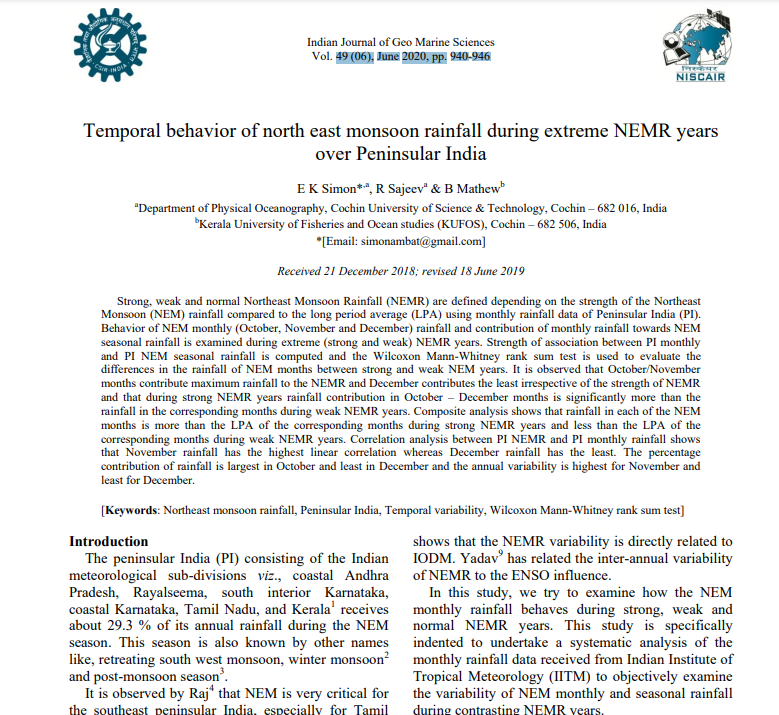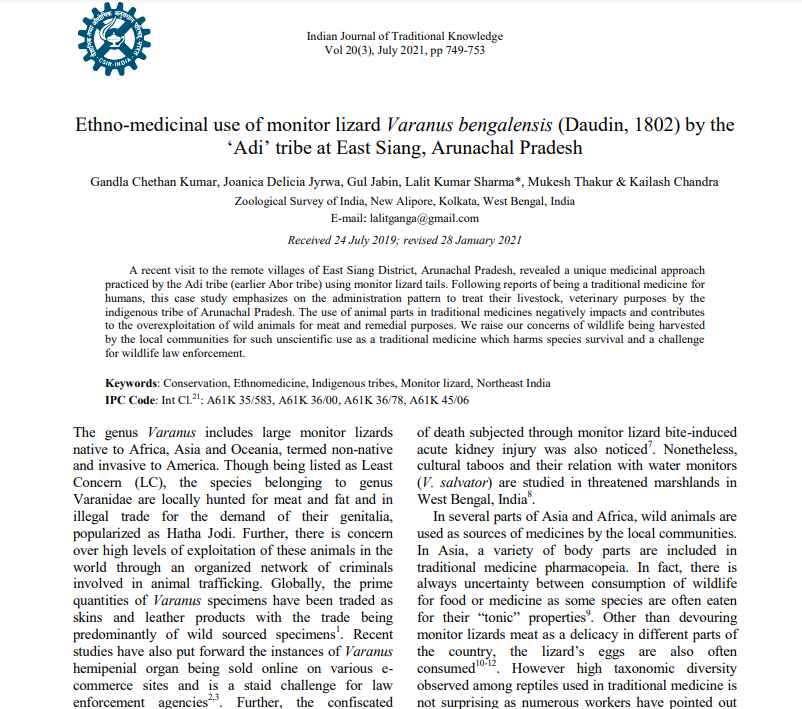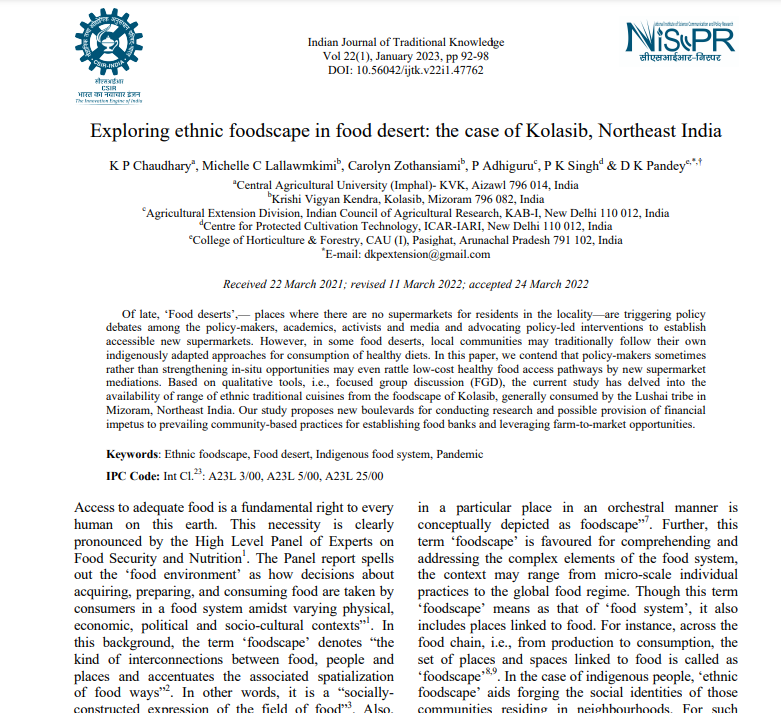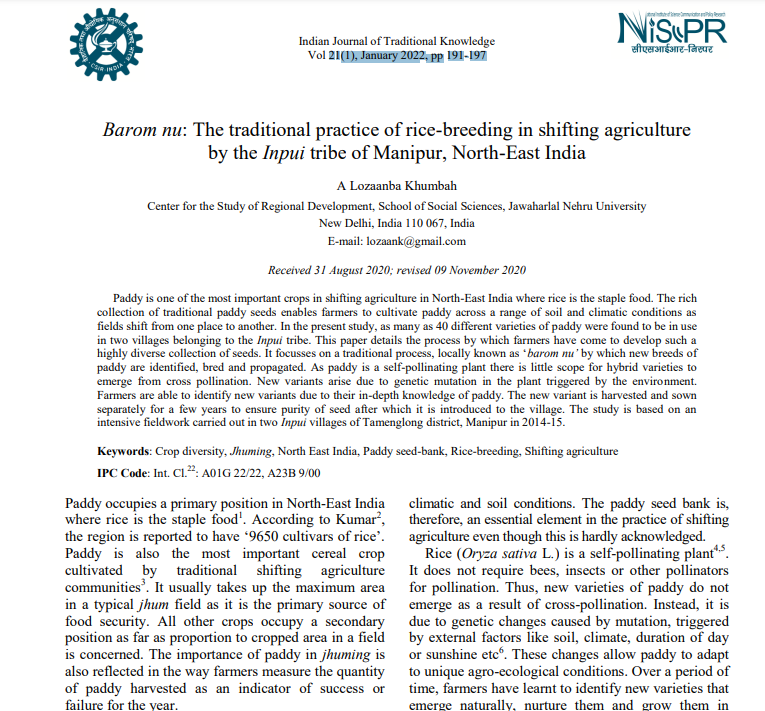Research Papers/Articles

Indigenous Technical Knowledge For Control of Insect Pest And Livestock Disorders
2008
Author(s): Majhi SK
The paper outlines the salient feature of traditional belief in relation to agricultural practices as well as for livestock management. The study carried out in VR Palem village of Ponnuru mandal, Andhra Pradesh revealed that the villagers use indigenous knowledge, including treatment of some of the human disease.
Notes on Herbal Treatment Practiced by the People of Fringe Villages of Manas National Park, India
2015
Author(s): Bhattacharjya DK, Kar A , Sarma H , Patowary KN
The present study deals with the herbal recipes of 49 plant species belonging to 35 families administered against 30 diseases/ailments among the people of the fringe villages.

Temporal Behavior of North East Monsoon Rainfall During Extreme NEMR Years Over Peninsular India
2020
Author(s): Simon EK, Sajeev R, Mathew B
Strong, weak and normal North East Monsoon Rainfall (NEMR) are defined depending on the strength of the Northeast Monsoon (NEM) rainfall compared to the long period average (LPA) using monthly rainfall data of Peninsular India (PI). Behavior of NEM monthly (October, November and December) rainfall and contribution of monthly rainfall towards NEM seasonal rainfall is examined during extreme (strong and weak) NEMR years.
Survey of Wild Food Plants for Human Consumption in Geçitli (Hakkari, Turkey)
2015
Author(s): Kaval I , Behçet L,Çakilcioğlu U
The present study shows that further ethnobotanical investigations are worthy to be carried out in Turkey, where most of knowledge on popular food plants are still to discover. In Turkey, the number of ethnobotanic studies is ever-increasing.

Ethno-Medicinal Use of Monitor Lizard Varanus bengalensis (Daudin, 1802) By The ‘Adi’ Tribe at East Siang, Arunachal Pradesh
2021
Author(s): Kumar GC, Jyrwa JD, Jabin G, Sharma LK,Thakur M, Chandra K
A recent visit to the remote villages of East Siang District, Arunachal Pradesh, revealed a unique medicinal approach practiced by the Adi tribe (earlier Abor tribe) using monitor lizard tails.
Ethnoveterinary Practices for Small Ruminants Followed by Rural Folks in Southern Odisha
2015
Author(s): Rautray AK, Sahoo R , Sardar KK, Patra RC , Sahoo A
A total of 23 species of herbal plants have been identified which were used either alone or in combination as traditional remedies for 24 different conditions/ diseases in livestock including important conditions like hoof infection, liver disorder and enteritis to emergency conditions like tympany/ bloat and hemorrhage.

Exploring Ethnic Foodscape in Food Desert: The Case of Kolasib, Northeast India
2023
Author(s): Chaudhary KP , Lallawmkimi MC ,Zothansiami C , Adhiguru P ,Singh PK ,Pandey DK
In some food deserts, local communities may traditionally follow their own indigenously adapted approaches for consumption of healthy diets. In this paper, we contend that policy-makers sometimes rather than strengthening in-situ opportunities may even rattle low-cost healthy food access pathways by new supermarket mediations.
Wild Plants from Open Markets on both sides of the Bulgarian-Turkish Border
2015
Author(s): Dogan Y, Nedelcheva A
This study focuses on the diversity of wild plants found in open markets in urban areas on both sides of the Bulgarian-Turkish border, sold as food and plants for prevention, treatment and healing.

Barom nu: The Traditional Practice of Rice-Breeding in Shifting Agriculture By The Inpui Tribe of Manipur, North-East India
2022
Author(s): Khumbah AL
Paddy is one of the most important crops in shifting agriculture in North-East India where rice is the staple food. The rich collection of traditional paddy seeds enables farmers to cultivate paddy across a range of soil and climatic conditions as fields shift from one place to another.
Ethnoveterinary Medicines Used by Goat Keepers in Marwar Region of Rajasthan, India
2015
Author(s): Dudi A , Meena ML
This study shows that a variety of traditional practices were observed being followed for treatment of various ailments and diseases of the goat with the use of locally available material, herbs, etc.



